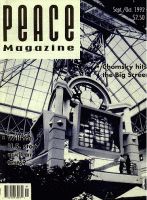
Peace Magazine Sep-Oct 1992, page 5. Some rights reserved.
Search for other articles by various here
We were puzzled by a statement in the review of our book, Canada and the World (Peace Magazine Vol.VIII No.4, p.27):
"He [referring to one of the authors] is very clear on the issue except for the Gulf War where he tends to come down on both sides..."
Commenting on the Gulf War, we wrote:
"By participating in this war, Canada has tarnished its image as a peace-keeper... the Gulf War not only deflected huge resources which might have been used in coping with environmental degradation. It also contributed to the degradation of the environment by destroying the infrastructure of a country; by polluting the waters of the region, by instigating the destruction of oil wells. By associating itself with this orgy of destruction, Canada has damaged its reputation as a country seriously concerned with environmental protection and beginning to do something about it... The Gulf War has aggravated the hatreds and resentments that have fuelled the chronic violence in the Third World..."(p.26)
Incidentally, the subtitle of the book is Agenda for the Last Decade of the Millenium not An Agenda for the Last Millennium, as it appears in the review. At any rate we hoped when we wrote the book that the next millenium will not be the last.
Anatol and Anthony Rapoport, University of Toronto
I like the new format, and find it easier to read. I find the articles interesting, informative, and often disturbing. Peace has so small a voice in our increasingly violent world, but it is our only hope for a future.
Eve Zablosky, Delta, BC
I was very unhappy about Rob Prince's article about the World Peace Council. I considered it an insult to those of us who gave years of our lives working with the Peace Councils connected with the WPC. It must be remembered that it was the WPC which launched the Stockholm appeals, which had a great effect.
Dorothy Morrison, Vancouver, BC
In the July/August issue there is a letter from R.L. Stevenson which attacks Rob Prince. Stevenson claims to have been "a peace activist in Canada from 1949 to the present." I imagine Stevenson has been calling himself a peace activist since 1949, but his letter reveals that during the Cold War he was something very different, namely a pro-Soviet activist.
Stevenson proudly tells us of the prominent positions he held during the Cold War in the World Peace Council (WPC) and its Canadian affiliate the Canadian Peace Congress. These organizations were created in the late ‘40s by pro-Soviet activists on Stalin's instructions, and were faithful supporters of the Soviet dictatorship throughout the Cold War. Those in control of the WPC and its affiliates supported things fundamentally contrary to the peace perspective, such as the Soviet invasions of Hungary, Czechoslovakia, and Afghanistan, and such as the Soviet prosecution of political activists, including Russian and East European peace activists.
Given the record, Stevenson has a lot of gall to claim to have been a peace activist since 1949.
Unlike the pro-Soviet constituency, peace activists believe in peace and human rights everywhere, and have never supported invasions, dictatorship or persecution.
During the Cold War it was standard for members of the pro-Soviet constituency to slander and otherwise try to discredit peace activists they disliked for political reasons, especially those who committed the cardinal sin of criticizing the Soviet Union. Stevenson's letter appears to be an attempt to continue the tradition. In an all too familiar ploy Stevenson says that by criticizing the former Soviet groups Prince "places himself in tne company of the Kissingers, Reagans, Haigs..." In reality, of course, it is possible to be critical of both Washington and the former Soviet Union at the same time-indeed a critical perspective on both has long been a hallmark of authentic peace activism.
Simon Threlkeld, Toronto, Ontario

Peace Magazine Sep-Oct 1992, page 5. Some rights reserved.
Search for other articles by various here